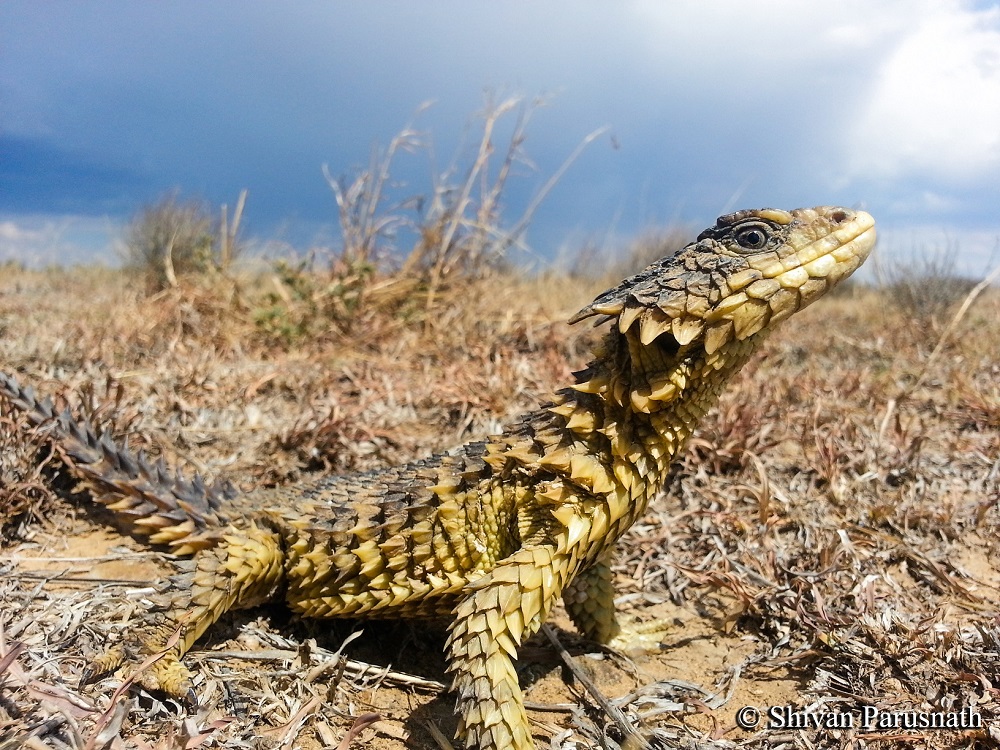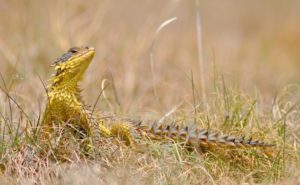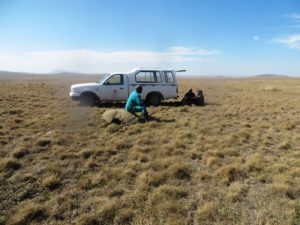Sungazer lizards in South Africa

Status
Vulnerable
Population
Unknown
Scientific name
Smaug giganteus
Improving the prospects for one of South Africa's most unique lizard species.
The problem
Sungazer lizards are endemic to the central grasslands of South Africa. Current population estimates and the extent of the species distribution are unknown within these relatively arid grasslands dominated by crop and livestock agriculture. The sungazer is unusual as it does not live among rocks, but rather shelters in self-excavated grassland burrows that extend up to 420 mm below the soil surface and are prone to destruction during crop cultivation. Agricultural practises are therefore a major and direct threat to the species, destroying large tracts of habitat and creating fragmented, isolated populations.
The solution
 The Sungazer Conservation Project is one of the largest reptile species conservation projects in South Africa. Ian Little and his team at the Endangered Wildlife Trust’s Threatened Grassland Species Programme are very excited about this ground-breaking conservation work which is growing by the day and represents much more than just a species conservation effort. Sungazer lizards are flagships for highland grasslands and South Africa and the associated formal protection of these intact areas results in the conservation of a number of other species as well as critical ecosystem services (especially freshwater production) for people. Their work with farmers is also continuing and we are building strong relationships with many landowners who have sungazer populations on their properties.
The Sungazer Conservation Project is one of the largest reptile species conservation projects in South Africa. Ian Little and his team at the Endangered Wildlife Trust’s Threatened Grassland Species Programme are very excited about this ground-breaking conservation work which is growing by the day and represents much more than just a species conservation effort. Sungazer lizards are flagships for highland grasslands and South Africa and the associated formal protection of these intact areas results in the conservation of a number of other species as well as critical ecosystem services (especially freshwater production) for people. Their work with farmers is also continuing and we are building strong relationships with many landowners who have sungazer populations on their properties.
Ian’s team is now working on many fronts. They will increase the amount of priority sungazer habitat that is under formal conservation protection. The team will also establish a national studbook for sungazers and ensure that all captive facilities and captive individuals are included in this studbook. By conducting targeted conservation oriented research they will then understand their dispersal behaviour, how and where they use their remaining habitat and be able to estimate the population. This in turn will enable Ian and his team to reassess their IUCN red-list status. Working with local communities to raise awareness and educate them about this unique species will, we hope, also reduce the demand for sungazers in traditional medicine (muthi), ensuring them further protection, and make sure people are aware that this type of use is against the law. Finally the team will aim to raise public awareness around the impacts of keeping reptiles, and especially sungazers, in captivity with the aim of reducing this demand.
Latest update
 Our team in South Africa are still working hard to protect the incredible, endemic sungazer lizard. Two students – Happy-Boy and Richard – have taken up the challenge of identifying where sungazers are still found on the grasslands of the Highveld in north eastern Free State. The sungazers’ distribution is limited to just 100,000 hectares – which might sound huge but they’re found nowhere else on earth. The team are working with farmers to ensure a further 5,000 hectares are brought under stewardship by the farmers who own the land. They’ve already persuaded 20 farmers to become stewards and sign up to an agreement to protect a total of 16,000 hectares of their land for sungazers. Happy-Boy and Richard are targeting areas with active burrows and then they’ll work with Field Officer Bradley Gibbons to try and persuade the farmers who own that land to work with them in conserving the habitat for sungazers. Good luck to the team – we’ll bring you more updates soon.
Our team in South Africa are still working hard to protect the incredible, endemic sungazer lizard. Two students – Happy-Boy and Richard – have taken up the challenge of identifying where sungazers are still found on the grasslands of the Highveld in north eastern Free State. The sungazers’ distribution is limited to just 100,000 hectares – which might sound huge but they’re found nowhere else on earth. The team are working with farmers to ensure a further 5,000 hectares are brought under stewardship by the farmers who own the land. They’ve already persuaded 20 farmers to become stewards and sign up to an agreement to protect a total of 16,000 hectares of their land for sungazers. Happy-Boy and Richard are targeting areas with active burrows and then they’ll work with Field Officer Bradley Gibbons to try and persuade the farmers who own that land to work with them in conserving the habitat for sungazers. Good luck to the team – we’ll bring you more updates soon.
